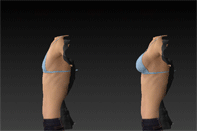The start of a new year is always a time for self-reflection and setting goals to better yourself. If you’ve spent the last year – or longer – unsatisfied with your appearance and considered making a change by finally investing in breast augmentation surgery, now might be the time.
The first step in that process is to realize that you must make that change in order to be truly happy. A physical change, whether in appearance, clothing, or surgical enhancements, can do wonders for your self-esteem and help boost your confidence to the levels you desire.
We’ve compiled a list of ways that breast augmentation surgery can have a lasting impact on your daily life. Physically and mentally, the changes that you go through in life shape the person that you are. If you are unhappy with the way you feel, or the way you project yourself onto others, it might be time to make a change.
How can Breast Implants Change Your Life?
- You’ll project more confidence in everyday life.
- You’ll be happier with your appearance. When you look good, you feel good about yourself!
- Wear what you’ve always wanted to wear and look amazing!
- There will be a better selection when bra shopping. All the styles you coveted will now look fantastic!
- You’ll fill out a V-neck top, a bikini top, or a low-cut dress like never before.
- Strapless dresses and tops that might not have been an option previously, now can be worn with confidence.
- Time to go shopping! A new body deserves a stylish new wardrobe to highlight your best assets.
- No more padded bras.
- No stuffing your bra or using “chicken cutlets.” That lift will be all you!
- No more hurtful jokes.
- Breasts that sag or are stretched from pregnancy, breastfeeding, and age will appear young and full again.
- You’ll feel more feminine and desirable.
- Spice up your love life! More body confidence leads to more bedroom confidence.
- More intimacy can reignite or deepen your romantic relationships.
- Single? Attract more attention…
- …and feel more outgoing and confident in social situations.
- Be bold! Go for the promotion, ask for the raise, take the solo vacation. Body confidence can translate to self-confidence in all areas of life!
- Foster deeper social connections. When you’re no longer self-conscious about your body, you can focus on people and conversations!
- Say goodbye to bra and swimsuit shopping anxiety!
- Stop smoking for good. You must quit prior to having the surgery, so you might as well make it a permanent, positive change!
- Get into a consistent workout routine. You want the rest of your body to look as good as your implants.
- Eat healthy. Stave off stretch marks and awkward changes by maintaining a healthy weight.
- Enjoy getting UN-dressed.
- Foster deeper connection with your body for a more positive self-image.
- More general body awareness can lead to early detection of potential health issues.
- Boost self-esteem.
- Fight gravity as you age.
- Breast size won’t decrease if you lose weight.
- Become more proportionate head to toe.
- Love the way you look in the mirror.
- It’s a positive and permanent action to make YOU happier with your body.
Making the decision to get breast implants can change your life by making you look and feel better, and those positive effects can influence other aspects of your life. When considering implants, it’s important to maintain realistic expectations of what your implants will look like and what kind of impact they’ll have on your life.
Breast Implants Can Affect Your Health
Implants won’t automatically boost your self-esteem, improve your love life, kickstart your career, or fix depression or social anxiety. More serious underlying issues should be addressed with a professional before proceeding with breast augmentation. If you’re unhappy in many areas of your life, implants aren’t a magic cure-all, but if you’re simply unsatisfied with the size or shape of your natural breasts, implants may help create the change you seek. Talk to your plastic surgeon about your reasons for getting implants and your expectations post-surgery to make the best decision for you.
Breast implants can also have a huge effect on your mental health as well. While your physical enhancements will be visible from the outside, the confidence you gain through feeling good about yourself can manifest itself in other ways as well. Don’t just look at implants as a way to enhance your physical features, but to also enhance your inner beauty as well.
If you’re thinking about breast augmentation surgery, contact Dr. Adams today to set up a consultation, or reach out to us with any questions you may have.














